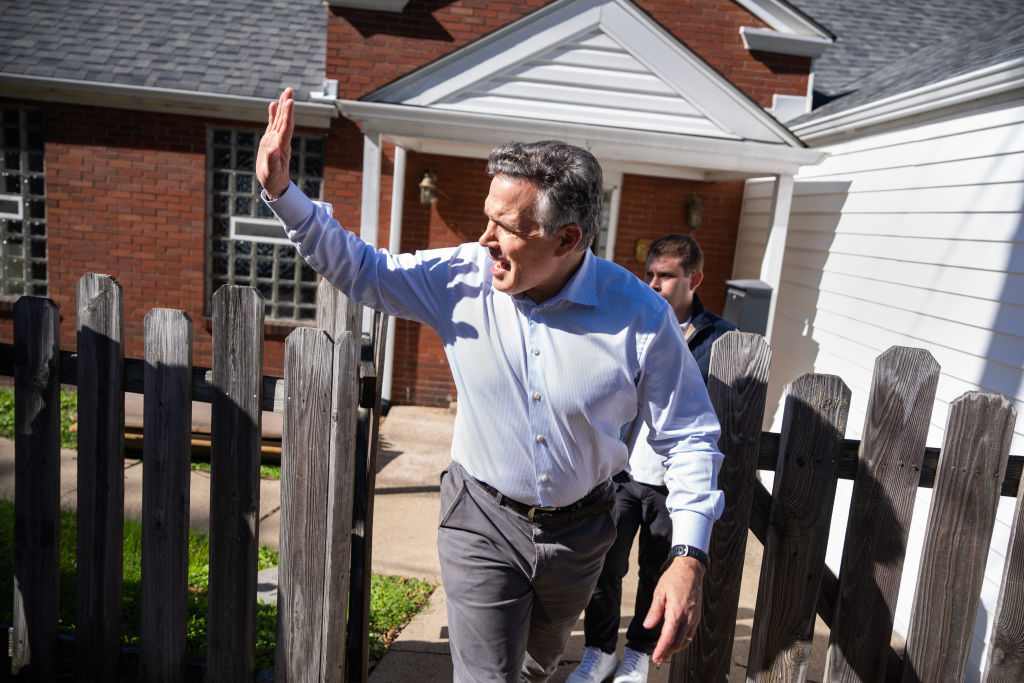Happy Monday! Election Day is 22 days away. As we head into the final stretch of this campaign, we’re definitely not getting as much rest as we should. If only we had Donald Trump’s unusual ability to only need four hours of sleep a night.
Up to Speed
- Former President Donald Trump brought up the possibility of using the military to quash the actions of “radical left lunatics” on Election Day in an interview that aired yesterday on Fox News’ Sunday Morning Futures. Interviewer Maria Bartiromo had floated the potential danger of foreign actors taking nefarious actions on November 5. “I think the bigger problem is the enemy from within,” Trump said. “We have some very bad people.” He added that “it should be very easily handled by, if necessary, by National Guard, or if really necessary, by the military, because they can’t let that happen.” Later in the interview, Trump used “enemy from within” to describe California Rep. Adam Schiff, a candidate for his state’s Senate seat who served as the lead prosecutor in the former president’s first impeachment trial.
- Authorities arrested a man who tried to enter Trump’s Saturday rally in Coachella, California, with a shotgun, handgun, and high-capacity magazine, which he was said to have illegally possessed. “If you’re asking me right now, I probably did have deputies that prevented the third assassination attempt,” Riverside County Sheriff Chad Bianco said at a Sunday news conference. The motive of the suspect, who was released on a $5,000 bail the same day authorities took him into custody, was unclear. “The U.S. Secret Service assesses that the incident did not impact protective operations and former President Trump was not in any danger,” the Secret Service and FBI said in a joint statement Sunday.
- An internal polling memo from Senate Leadership Fund, a super PAC with ties to Senate Minority Leader Mitch McConnell, sheds some light on how the group thinks key races will impact control of Congress’ upper chamber, as reported by Politico. Sen. Jon Tester of Montana has been the most vulnerable Democrat this cycle, and his challenger, Tim Sheehy, had a durable lead. In Ohio, Republican challenger Bernie Moreno had cut incumbent Sen. Sherrod Brown’s polling lead but still ran several points behind him. Democratic Sens. Bob Casey of Pennsylvania and Tammy Baldwin of Wisconsin were 2 points and 1 point, respectively, ahead of their Republican opponents. Republican candidates for open seats in Michigan and Maryland were several points behind their Democratic opponents. Finally, Republican Sen. Ted Cruz of Texas was just 1 point ahead of challenger Rep. Colin Allred. And Steven Law, the Senate Leadership Fund’s president, described Nebraska Republican Sen. Deb Fischer’s race as “a serious trouble-spot” that might need intervention, pending polling the organization was conducting.
Suburbanites a Top Priority for Both Republicans and Democrats

NEW HOPE, Pennsylvania—Jim Greenwood received a telephone call from Hunter Biden the day after his father’s fateful June debate with Donald Trump.
The former Republican congressman has been supporting top-of-the-ticket Democrats, including President Joe Biden and Pennsylvania Sen. Bob Casey, since Trump emerged as the Republican nominee in 2016. Greenwood was a Biden surrogate and raised money for him. But after Biden’s disastrous debate, Greenwood told his campaign the president should withdraw from the race, and Hunter Biden’s pitch to continue supporting his father’s reelection bid fell on deaf ears.
Nearly four months later, Greenwood is convinced the switch from Biden to Kamala Harris turned Pennsylvania from a sure loss to winnable.
The vice president, he said, is on her way to victory in suburban Philadelphia’s Bucks County, the Keystone State bellwether Greenwood represented in Congress from 1993 to 2005, and where he still lives. Greenwood also believes Harris is making inroads with Republican voters here, a product of her campaign’s robust effort to court disaffected conservatives like him. But asked to predict Harris’ margin over Trump in Bucks County, or the percentage of GOP voters she’ll attract, Greenwood hedged.
“She’ll carry Bucks County—she will, yeah, I’m almost certain of that. Now, again, by what percentage?” Greenwood told Dispatch Politics during an interview Friday in his home office in New Hope, an upscale, rural community in northern Bucks County. “I wish I had that crystal ball.” As for Harris’ bid to woo Republican voters, an operation receiving significant resources and attention?
“I think it’s working a little bit,” said Greenwood, who is playing a key role in the effort in Pennsylvania. “It’s working enough—a little bit enough—that it’s moved her from being behind, significantly behind, 5 or 7 [percentage] points, whatever it was when she got in, to dead even, and maybe a couple points up. So I think there’s momentum with her.” (According to the RealClearPolitics polling average, the race is statistically tied.)
Bucks County isn’t Pennsylvania’s only bellwether. The suburban parts of Pittsburgh’s Allegheny County fit that bill, as do Erie County and Northampton County.
But Bucks is crucial for Harris. The relatively wealthy enclave of nearly 650,000 people has a significant concentration of college-educated, middle-class, and working-wealthy voters who have trended Democratic in the Trump era. The median income here is more than $107,000, versus $74,000-plus statewide, and more than 44 percent of residents have a bachelor’s degree or higher, according to United States Census figures. As of last month, the median sales price for a home in the county was $475,000, per Rocket Mortgage.
In 2016, Democratic nominee Hillary Clinton topped Trump in Bucks County just narrowly, 48.4 percent to 47.6 percent, while losing statewide to the future 45th president, 48.2 percent to 47.5 percent. Four years later, Biden won Bucks County 51.7 percent to 47.3 percent, a more comfortable margin that helped fuel a 50 percent to 48.8 percent victory over Trump across the entire commonwealth. Republicans are looking to counter the Democrats in part with a focus on turning out voters in the more blue-collar suburban neighborhoods of Bucks County who, records show, are not regular voters.
Dispatch Politics got a glimpse of that effort Friday afternoon, going door to door with the GOP-aligned Sentinel Action Fund in Levittown, Pennsylvania, a Bucks County community 20 miles southeast of Greenwood’s well-appointed home in New Hope. Sentinel is a super PAC focused on electing Dave McCormick, the Republican challenging Casey in the Keystone State’s hard-fought Senate race. In particular, the group’s door-to-door canvassers are encouraging targeted GOP voters to mail in their ballots rather than wait until Election Day.
“The energy’s trending in a really positive direction for us. We see it in the polls as well,” Eli Huber, field manager for Sentinel Action Fund, said. “At doors, maybe where two months ago people were a little hesitant, didn’t know a lot about McCormick, as they’ve gotten to know him, people are starting to like him more and more.”
“A lot of Trump voters realize that if they want to have [a] successful second Trump term, that they also have to deliver conservatives [to] the Senate,” Huber added. (Casey still leads in polling averages but McCormick has cut into the incumbent’s lead.)
Levittown is a middle-class community chock full of modest, single-family homes. The yards are manicured but simply landscaped, and the houses are mid-20th century ramblers encased in siding—some in need of updating, some not. Halloween decorations predominated throughout the neighborhood Sentinel canvassed Friday in the early afternoon, while political yard signs were few and far between. Indeed, some homes featured “no politics” signs on their front doors. Of five homes advertising support for a candidate, four backed Trump and one backed Harris.
Yard signs are not destiny. But that mirrors the realignment of the political parties happening in Pennsylvania writ large—and in much of the country. Former Democratic strongholds like Levittown are more likely to back Trump and McCormick, while the wealthier parts of Bucks County are more apt to support Harris and Casey. That this neighborhood had few yard signs was hardly a surprise. Sentinel’s strategy is to target low-propensity voters.
The group’s goal is not simply to extract commitments to vote from these voters, but to sell them on doing so early, via the U.S. Postal Service. This is something Republicans have been hesitant to do because of Trump’s past insistence that the only reliable way to cast a ballot is in person and on Election Day. The former president this time around is paying lip service to voting by mail, although his grassroots supporters are working overtime to convince Republicans to overcome their resistance to mail-in voting.
Of the handful of targeted voters reached Friday afternoon while Dispatch Politics observed, Sentinel found Pennsylvanians planning to pull the lever for Trump and receptive to McCormick, if not already on board. As for embracing mail-in voting, it was clear from those same voters’ stated preference to vote on November 5 that this part of the group’s strategy is going to take more work.
Sunday Show Rewind
- For the second week in a row, top Republicans faced questions about whether former President Donald Trump lost the 2020 election and whether they would accept the results of next month’s. Sen. J.D. Vance seemed even less eager to acknowledge his running mate’s defeat. “I’ve said repeatedly I think the 2020 election had problems. You want to say ‘rigged,’ you want to say he won? Use whatever vocabulary term you want. I want to focus on the fact that we had big technology firms censoring our fellow citizens in a way that violated our fundamental rights,” he told ABC News’ Martha Raddatz on This Week. “The fact that you’re so obsessed with what word I use to describe this phenomenon rather than the phenomenon itself suggests something very broken in the American media.”
- House Speaker Mike Johnson appeared on two Sunday shows this weekend. On Face the Nation, the Louisiana Republican praised improvements in election integrity at the state level but lamented that non-citizens would vote illegally. “The greater issue and the bigger story is that you had really great work done in most of the states to shore up their systems and to make sure that we have a free and fair election,” he told CBS anchor Margaret Brennan. He added, however, “I think there is going to be some cheating in this election. I think non-citizens are going to vote.”
- On NBC’s Meet the Press, Johnson said that Congress would certify a legitimate 2024 election regardless of who wins. “A free and fair and legal election will be certified, and that is our hope and prayer across the board. Of course I’m going to follow the Constitution. I’m going to follow the law. That’s my job. It’s my duty. I took an oath to do that, and I will fulfill my oath,” he said. Asked by anchor Kristen Welker whether his saying that he would certify “if the election is free and fair and legal” undermines people’s confidence in the results, Johnson said it should not. “What I’m saying there is what the Constitution provides, what the Supreme Court has affirmed time after time, what history has affirmed,” he said. Johnson voted against certifying the 2020 election before he was speaker, and he led a brief encouraging the Supreme Court to overturn Trump’s loss.
Eyes on the Trail
- Vice President Kamala Harris this evening will host a campaign rally in Erie, Pennsylvania. From there, the Democratic nominee will head to Detroit and overnight in Michigan.
- Former President Donald Trump this evening will host a town hall meeting at the Greater Philadelphia Center and Fairgrounds in Oaks, Pennsylvania.
- Minnesota Gov. Tim Walz travels to Wisconsin today where he will headline Harris campaign events in Eau Claire. Then, the Democratic vice presidential nominee heads to Green Bay, where he will be joined by Michigan Gov. Gretchen Whitmer and Wisconsin Gov. Tony Evers for the kickoff of the Harris campaign’s “Driving Forward, Blue Wall Bus Tour” across Wisconsin, Michigan, and Pennsylvania.
- First lady Jill Biden today will campaign for Harris in suburban Detroit and Democratic stronghold Madison, Wisconsin.
Notable and Quotable
“He was speaking directly to young black voters, young black men specifically, and making sure that they understand: Look, sometimes you have to take a step back and look at your own bias.”
—Democratic Rep. Maxwell Frost of Florida on former President Barack Obama’s speculation that black men are not enthused about voting for Vice President Kamala Harris because she is a woman, October 13, 2024








Please note that we at The Dispatch hold ourselves, our work, and our commenters to a higher standard than other places on the internet. We welcome comments that foster genuine debate or discussion—including comments critical of us or our work—but responses that include ad hominem attacks on fellow Dispatch members or are intended to stoke fear and anger may be moderated.
With your membership, you only have the ability to comment on The Morning Dispatch articles. Consider upgrading to join the conversation everywhere.